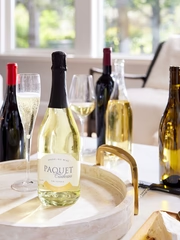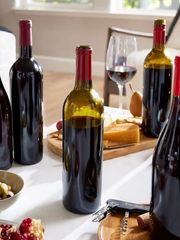 Just about seven years ago, I set out on the road, seeking a golden appellation. I am still looking for fame and fortune but I found a true gem for grape growing.
The Terroir
I often talk about the cooling influence of the Pacific Ocean and the Petaluma Gap on the coastal wine regions of Mendocino, Sonoma, Napa or Monterey. There is a misconception regarding the more central valley location of Lodi. Great wines require a balance between freshness, ripeness, and acidity because of the climate. In this case, the necessary cooling breezes come from the Delta. This body of water stretches from the Carquinez Strait to the Sacramento–San Joaquin Delta.
This is considered a Mediterranean climate with sunny days during the growing season and large diurnal temperatures drop. Well-drained soils, from deep, sandy loam to shallower sandy clay loam, to gravelly or cobbled clay, provide a great opportunity for our partner growers. Both white and red wines are fresh, dense, savory, mineral and textured. An interesting fact is this soil, unlike many other appellations, is covered with large rocks, similar to the French region of Chateauneuf du Pape.
Just about seven years ago, I set out on the road, seeking a golden appellation. I am still looking for fame and fortune but I found a true gem for grape growing.
The Terroir
I often talk about the cooling influence of the Pacific Ocean and the Petaluma Gap on the coastal wine regions of Mendocino, Sonoma, Napa or Monterey. There is a misconception regarding the more central valley location of Lodi. Great wines require a balance between freshness, ripeness, and acidity because of the climate. In this case, the necessary cooling breezes come from the Delta. This body of water stretches from the Carquinez Strait to the Sacramento–San Joaquin Delta.
This is considered a Mediterranean climate with sunny days during the growing season and large diurnal temperatures drop. Well-drained soils, from deep, sandy loam to shallower sandy clay loam, to gravelly or cobbled clay, provide a great opportunity for our partner growers. Both white and red wines are fresh, dense, savory, mineral and textured. An interesting fact is this soil, unlike many other appellations, is covered with large rocks, similar to the French region of Chateauneuf du Pape.
 Growing Grapes
Since 1986, this region features 551,000 acres. However, only 1/5 of this land has planted vineyards. Best known for its old vine Zinfandel, Lodi also produces Merlot, Chardonnay, Cabernet Sauvignon and Sauvignon Blanc. Since the last visit of John Fogerty, growers have positioned themselves in quality and in variety. Lodi has the climate to excel at crisp whites with delicate florals, savory mineral and herb notes and citrusy brightness. Additionally, lesser known varietals thrive here, such as Kerner, Bacchus, Riesling, Gewürztraminer, Albariño, Verdejo, Garnacha Blanca, Tempranillo, Garnacha and Monastrell.
Growing Grapes
Since 1986, this region features 551,000 acres. However, only 1/5 of this land has planted vineyards. Best known for its old vine Zinfandel, Lodi also produces Merlot, Chardonnay, Cabernet Sauvignon and Sauvignon Blanc. Since the last visit of John Fogerty, growers have positioned themselves in quality and in variety. Lodi has the climate to excel at crisp whites with delicate florals, savory mineral and herb notes and citrusy brightness. Additionally, lesser known varietals thrive here, such as Kerner, Bacchus, Riesling, Gewürztraminer, Albariño, Verdejo, Garnacha Blanca, Tempranillo, Garnacha and Monastrell.
 The Certified Green Lodi Rules are positioning growers extremely well for the quality of grapes and wines produced in this region. Members of the Wine Institute and the California Association of Winegrape Growers (CAWG) introduced a practical self-assessment workbook for both winemakers and winegrowers that encompass three areas of sustainability: Environmental Soundness, Economical Feasibility, Social Equality. The metrics for CCSW include over a hundred criteria which are ranked from 1–4 in water use, energy use, greenhouse gas emissions and nitrogen use. Today, to become fully certified with CCSW, a third party is required to audit the assessments.
The Lodi Rules also include a pesticide assessment system that rates a vineyard’s pesticide use on everything from farm workers’ health to wildlife risk.
I think we can now call Lodi one of the most Fortunate Sons of the California scene. John I'm sure, will agree with me.
View all of our current Lodi wines here.
The Certified Green Lodi Rules are positioning growers extremely well for the quality of grapes and wines produced in this region. Members of the Wine Institute and the California Association of Winegrape Growers (CAWG) introduced a practical self-assessment workbook for both winemakers and winegrowers that encompass three areas of sustainability: Environmental Soundness, Economical Feasibility, Social Equality. The metrics for CCSW include over a hundred criteria which are ranked from 1–4 in water use, energy use, greenhouse gas emissions and nitrogen use. Today, to become fully certified with CCSW, a third party is required to audit the assessments.
The Lodi Rules also include a pesticide assessment system that rates a vineyard’s pesticide use on everything from farm workers’ health to wildlife risk.
I think we can now call Lodi one of the most Fortunate Sons of the California scene. John I'm sure, will agree with me.
View all of our current Lodi wines here.





